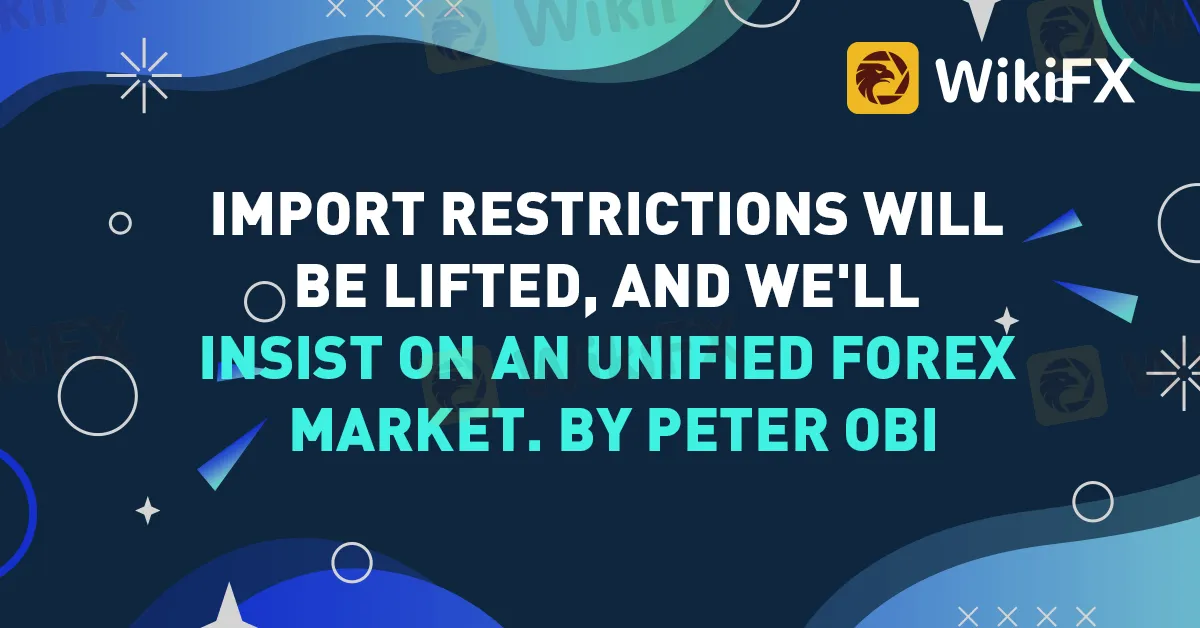简体中文
繁體中文
English
Pусский
日本語
ภาษาไทย
Tiếng Việt
Bahasa Indonesia
Español
हिन्दी
Filippiiniläinen
Français
Deutsch
Português
Türkçe
한국어
العربية
IMPORT RESTRICTIONS WILL BE LIFTED, AND WE'LL INSIST ON AN UNIFIED FOREX MARKET. BY PETER OBI
Abstract:Mr. Peter Obi, the presidential candidate for the Labour Party (LP), claims that in order to resolve Nigeria's present forex crisis, his administration would remove import and foreign exchange limitations and insist on a single forex market if given the opportunity in 2023.

Mr. Peter Obi, the presidential candidate for the Labour Party (LP), claims that in order to resolve Nigeria's present forex crisis, his administration would remove import and foreign exchange limitations and insist on a single forex market if given the opportunity in 2023.
The multiple exchange rate policy, which encourages capital flight and discourages investment, has allegedly made the country's currency position worse, according to Obi.
Tuesday, the former governor of Anambra State listed some of the things he would do for the nation if elected president in 2023 on his Twitter account.
He added that he intended to increase remittances from their present $20 billion annual level to $40 billion to $60 billion and lower the country's jobless rate to less than 20 percent.
The only option to stop monopoly and capital flight is in this way. In order to regain investor confidence, we will look into ways to mainstream the parts of diaspora remittances that are still unregulated and unofficial in order to cushion the FX demands. He spoke.
He said that given the influence of job creation on the economy and the need to reduce poverty, one of his goals for the economy will be to support it.
Our tax-to-GDP ratio, which this year declined by 1.3 percentage points, from 7.3% to 6.0%, and our debt-to-GDP ratio have a relationship. Our tax to GDP ratio is one of the lowest in the world when compared to peer countries, which range from 15% to 25%. Our overdependence on oil, excessive borrowing, and fiscal irresponsibility are our downfall in this regard. The current difficulties in tax collecting should be addressed by a simplified but improved system. He revealed.
In regards to food security, he said: Food inflation needs to be addressed first. Our food output will increase and inflation will decrease due to lower food prices once we address food insecurity and farmers return to their land. When subsidy is eliminated, in order to ensure food security and export, our concentration will be on agricultural and production-centered growth, with a stronger emphasis on exporting finished goods as opposed to commodities and raw materials. Mostly, this has to do with food and clothing.
Obi said of education: “Our government shall prioritize education to provide the following functions: technical and industry relevance; alignment with local comparative advantages and factor endowments; modern skills competency, critical thinking, ”
To address current bottlenecks, promote transparency, and provide increased flexibility, we will examine the legislation governing the fund access mechanisms to the Tertiary Education Trust Fund (TETFund) and the Universal Basic Education Commission (UBEC).
TETFund resources need to be strongly redirected toward paying universities and other higher education institutions in order to put an end to the ongoing strikes by university staff and employees. -PO
“Twenty million youngsters not in school is a serious national disaster. We will implement a mandatory ”No Child Left Behind educational policy as part of our Marshall Plan for Education, taking into account Nigeria's underinvestment in social areas including health, education, and housing, which has led to a significant number of out-of-school children.
He bemoaned the fact that a major portion of Nigeria's workforce, which is primarily made up of youths, lacks access to social security.
Ad hoc palliative intervention strategies include Conditional Cash Transfers (CCT). As beneficial as they are, medium and long-term social security systems will need to be sustainable. A social safety net needs to be in place to safeguard them. That falls under the purview of the government's duty to safeguard, Obi added.
Additionally, he stated that he intended to clear out the Lagos Ports through a systematic strategy of rewarding end-destination preferences.
This will reduce the amount of on-land heavy haulage transshipments that tax our road system.
The Nigerian maritime industry is solid and should get much better, according to Obi. We are fortunate to have a number of deep seaports. However, for some reason, we frequently center our import and export operations around the ports of Lagos, resulting in avoidable bottlenecks.

Disclaimer:
The views in this article only represent the author's personal views, and do not constitute investment advice on this platform. This platform does not guarantee the accuracy, completeness and timeliness of the information in the article, and will not be liable for any loss caused by the use of or reliance on the information in the article.
Read more

Will natural disasters have an impact on the forex market?
The forex market is known for its rapid responses to global events, but the influence of natural disasters, such as earthquakes and typhoons, can be less straightforward. While headlines may scream about catastrophic damage and economic disruption, the long-term effects on currency values often depend on a blend of immediate shock and underlying economic fundamentals.

Navigating the Intersection of Forex Markets, AI Technology, and Fintech
The financial world is transforming, driven by the rapid integration of artificial intelligence (AI) and innovative fintech solutions. This change is most apparent in forex markets, where algorithmic trading and deep learning are redefining strategies, risk management, and decision-making. In this article, we explore how AI-driven technologies are not only revolutionizing forex trading but are also propelling fintech innovations that enhance customer experiences, bolster security, and unlock new market opportunities.

The One Fear That’s Costing You More Than Just Profits
The fear of missing out (FOMO) is NOT what you think it is! Read the three lesser-discussed components that contribute greatly to FOMO trading!

SocialFi and the Forex Market: A New Era for Decentralized Social Trading?
The worlds of social media and decentralized finance (DeFi) have converged under a new banner—SocialFi. Short for “Social Finance,” SocialFi leverages blockchain technology to reward user engagement, giving individuals direct control over their data and interactions. While SocialFi has primarily emerged in the context of content creation and crypto communities, its principles could soon revolutionize the forex market by reshaping how traders share insights and monetize social influence.
WikiFX Broker
Latest News
How Crypto Trading Transforms FX and CFD Brokerage Industry
UK would not hesitate to retaliate against US tariffs - No 10 sources
FCA Warns Against 10 Unlicensed or Clone Firms
CySEC Warns Against 14 Unlicensed Investment Websites
Top Currency Pairs to Watch for Profit This Week - March 31, 2025
Will natural disasters have an impact on the forex market?
Philippines Deports 29 Indonesians Linked to Online Scam Syndicate in Manila
Navigating the Intersection of Forex Markets, AI Technology, and Fintech
Exposed: Deceptive World of Fake Trading Gurus – Don’t Get Fooled!
AI-Powered Strategies to Improve Profits in Forex Trading
Currency Calculator







